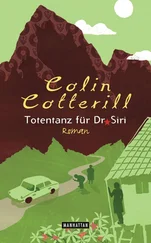Colin Cotterill - Disco for the Departed
Здесь есть возможность читать онлайн «Colin Cotterill - Disco for the Departed» весь текст электронной книги совершенно бесплатно (целиком полную версию без сокращений). В некоторых случаях можно слушать аудио, скачать через торрент в формате fb2 и присутствует краткое содержание. Жанр: Полицейский детектив, на английском языке. Описание произведения, (предисловие) а так же отзывы посетителей доступны на портале библиотеки ЛибКат.
- Название:Disco for the Departed
- Автор:
- Жанр:
- Год:неизвестен
- ISBN:нет данных
- Рейтинг книги:3 / 5. Голосов: 1
-
Избранное:Добавить в избранное
- Отзывы:
-
Ваша оценка:
- 60
- 1
- 2
- 3
- 4
- 5
Disco for the Departed: краткое содержание, описание и аннотация
Предлагаем к чтению аннотацию, описание, краткое содержание или предисловие (зависит от того, что написал сам автор книги «Disco for the Departed»). Если вы не нашли необходимую информацию о книге — напишите в комментариях, мы постараемся отыскать её.
Disco for the Departed — читать онлайн бесплатно полную книгу (весь текст) целиком
Ниже представлен текст книги, разбитый по страницам. Система сохранения места последней прочитанной страницы, позволяет с удобством читать онлайн бесплатно книгу «Disco for the Departed», без необходимости каждый раз заново искать на чём Вы остановились. Поставьте закладку, и сможете в любой момент перейти на страницу, на которой закончили чтение.
Интервал:
Закладка:
It had been a comparatively good day. Only one lady had made the journey to the cave of the dead. Dtui had personally been able to save the life, perhaps temporarily, of a ten-year-old child, and at two in the morning the residents at Kilometer 8 were all stoned into a restful sleep. Dtui and Singsai sat in front of the long rectangular room that formed the main ward. They were too fatigued to sleep, so they gazed up at the stars that showed themselves so rarely in the northeastern sky that the medic saw their appearance now as an omen.
“Days like this make you realize how stupid you are,” Dtui said.
“You aren’t stupid at all, Nurse,” Singsai assured her. He was such a brown-skinned little man his words seemed to come out of the darkness from a floating set of teeth. He reminded Dtui of the mummy in the president’s house.
“Okay, perhaps not stupid exactly, but… lacking.”
“You’ve done a lot of good today.”
“But there’s so much more I didn’t know how to do. It’s so frustrating. It makes me appreciate your Dr. Santiago and my own boss that much more. They do this stuff day in, day out, year after year, saving lives as if it were as natural as breathing.”
“I hope to be a surgeon someday,” Singsai told her, looking at the sky as if that were the place such a hope might hang. He was in his fifties and unconnected so Dtui knew he had little chance.
She scrambled for a change of subject. “Do you ever have any cases here that aren’t emergencies?”
“One or two malarials,” he said. “We’ve a little boy with chronic diarrhea. They say that’s the biggest killer of kids in the whole of Southeast Asia. Most of them don’t make it, but we’re fighting for this chap. He’s been lucky. Oh, and then there’s Mrs. Duaning.”
“What’s wrong with her?”
“Nobody knows. She’s been in a coma for two weeks. We found her out on the road.”
“Nobody’s come to claim her?”
“No.”
“Then how do you know her name?”
“We don’t, but we can tell she’s Hmong. One of our Hmong interns christened her ‘Duaning.’ It means ‘nuts.’”
They went to visit Mrs. Nuts, who lay in a small block away from the others, where the non-life-threatening cases were billeted. She was on her back with her eyes wide open, staring at the ceiling and muttering.
“What’s she saying?” Dtui asked.
“She only started speaking the day before yesterday. She says the same thing, over and over.”
Dtui leaned over her and listened. The old lady’s voice seemed less gravelly than one would have expected from such a battered old crone. The words came from her mouth on a breath that smelt musty. “Have to feed Panoy,” she said. “Have to feed Panoy.”
“You don’t suppose Panoy’s her name?”
“This woman’s? No. It isn’t a very Hmong-sounding name.” He pulled up the single blanket to cover her and her feet were momentarily exposed. Both Dtui and Singsai looked at them in amazement. “What the…?”
The soles of the woman’s feet were caked in some maroon substance. “Has she been walking anywhere?” Dtui asked.
“No. As far as I know, she hasn’t moved. And this doesn’t look like clay.”
Dtui scratched at one sole with her fingernail. She knew exactly what she was seeing. “It’s congealed blood,” she said.
“Why would she have…? Are there any wounds?”
Dtui took a damp cloth from the basin beside the bed and carefully rubbed at one foot. “No.”
“Then how…?”
“It doesn’t look random, Singsai. Look at this other foot. It’s as if someone painted symbols onto her soles.”
“With blood? Whatever for?”
“That Hmong intern might have some idea.”
“Right. I don’t want to wake him now, but in the morning I’ll be very interested to see if he has an explanation.”
“Me, too,” Dtui said. “Me, too.”
Two more emergencies during the night meant that Dtui didn’t actually get to sleep until after seven. The breeze through the thin cotton curtains woke her at ten. Before heading for the main block, she stopped by to see Mrs. Nuts. She still lay staring at the ceiling but her tune had changed during the night.
“Panoy is weak now. Panoy is weak,” she said.
“Who is Panoy?” Dtui asked.
“Panoy is weak.”
Dtui pushed back the woman’s white hair from her face and put her palm on the woman’s cold brow. Her skin seemed dull, as if she were covered in dust. Her pulse was slow. She wondered whether Mrs. Nuts would make it through the day. Before she left the room, Dtui pulled up the blanket to look at her feet. The left sole, the one she’d wiped clean earlier that morning, was once again covered in dried blood.
Dr. Siri was downstairs in the guesthouse dining room reading a month-old copy of Pasason Lao. There was a picture of his old friend Civilai shaking hands with a Mongolian diplomat. Both were smiling, neither convincingly. He could tell exactly what Comrade Civilai, his only ally on the politburo, was thinking. It reminded him of an earlier time and two more idealistic people.
For years, Siri and his wife, Boua, had been members of the Lao Issara, the Free Lao resistance. But Boua was working her way toward a more disciplined independence from the French than just being a nuisance to the colonists. She was the devout communist of the pair, and it was she who led Siri to Hanoi and into the Nguyen Ai Quoc college. There he learned his Vietnamese and attended classes in communist ideology. He was baptized in red paint, held under until he breathed Lenin and defecated Marx. And with this new vital system he’d gone out into the Vietnamese countryside and convinced the farmers that nothing but communism could free them from the yoke of French colonization. He’d worked in field hospitals throughout the north of the country, and even after eighteen straight hours of bloody surgery, he’d still find time to engage the villagers in ideological debates.
It was a period in his life he came to refer to as “the years they borrowed my mind.” It wasn’t until he met another enthusiastic cadre, a serious member of the Lao People’s Party and lifelong communist named Civilai, that Siri was able to put everything into perspective. Although he’d been trained to report comrades who strayed from the axiomatic straight and narrow, Civilai was so experienced and so obviously intelligent that Siri had no choice but to listen and reevaluate his own clouded beliefs. Civilai loved communism. There was no question of his loyalty to the Party. But he believed that communism should work without scaring the daylights out of people. For his opinions he was labeled an eccentric. He was too senior and too well respected by the masses to be kicked off the central committee, but he was kept backstage.
Siri had immediately warmed to Civilai’s middle path so he, too, had been ostracized by the top men of the Party. While Boua soldiered on in her attempts to educate a nation of proletariat, Siri hung up his red flag and became a full-time doctor. That was probably when his wife’s love for him began to dim. In Siri’s heart, the love light never went out. He loved her until her death, but he knew she’d already begun to consider her husband a disappointment. Through all that time, only his friendship with Civilai had kept him rational, and as the Party dumped more and more meaningless duties on Civilai, it was Siri who offered encouragement and hope to his friend.
The photograph before him showed one more symbolic handshake with one more foreign official. It was another snap for the diplomatic album. Civilai had told Siri he was becoming the Mickey Mouse of the new regime. He-
“Comrade?” Siri looked up to see the guard whose station was at the upstairs partition standing, drained of color, in the doorway. “You’re a doctor, right?”
Читать дальшеИнтервал:
Закладка:
Похожие книги на «Disco for the Departed»
Представляем Вашему вниманию похожие книги на «Disco for the Departed» списком для выбора. Мы отобрали схожую по названию и смыслу литературу в надежде предоставить читателям больше вариантов отыскать новые, интересные, ещё непрочитанные произведения.
Обсуждение, отзывы о книге «Disco for the Departed» и просто собственные мнения читателей. Оставьте ваши комментарии, напишите, что Вы думаете о произведении, его смысле или главных героях. Укажите что конкретно понравилось, а что нет, и почему Вы так считаете.












